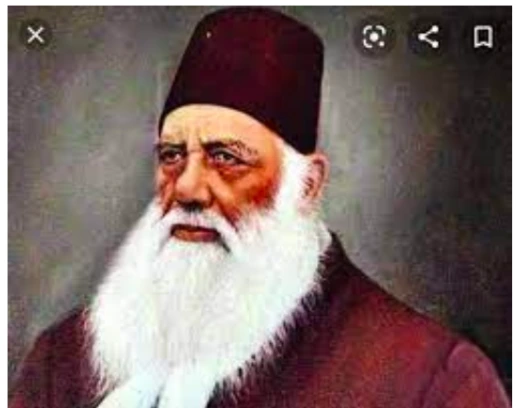Answer:
Approach:
|
Introduction:
The socio-cultural renaissance in India, especially during the 19th century, was marked by the emergence of several key figures whose ideas and actions contributed immensely to the shape of modern India. One such monumental figure was Sir Syed Ahmad Khan, a distinguished reformer, educator, and visionary. The essence of his philosophy is encapsulated in his statement, “When a nation becomes devoid of arts and learning, it invites poverty.” This assertion underscores the indispensable role of education, cultural enrichment, and intellectual revival in uplifting a nation economically, socially, and politically.
Body:
Educational Reforms:

Sir Syed Ahmad Khan firmly believed in the transformative power of education. In the aftermath of the 1857 revolt, he recognized the widening rift between the British and Indian communities, particularly Muslims who were lagging in modern education. To bridge this gap, he established the Mohammedan Anglo-Oriental College in Aligarh in 1875, which eventually evolved into the Aligarh Muslim University. His model was unique for its time, blending Western educational paradigms with Eastern culture and Islamic teachings, ensuring that students didn’t have to compromise their identity for modern education.
Bridging Cultural Divides:
Sir Syed Ahmad Khan’s efforts weren’t confined to education alone; they extended to a cultural renaissance. He strove to mitigate the deep-rooted suspicions between the Muslim community and the British rulers.
Conclusion:
Sir Syed Ahmad Khan, through his visionary reforms, laid foundational stones for an intellectually revitalized, socially progressive, and inclusive Indian society. His emphasis on education, rational thinking, cultural exchange, and social empowerment is evident in the modern Indian ethos. In a nation diverse in culture but united in aspirations, Sir Syed’s legacy continues to resonate, underscoring the belief that a nation thrives when it embraces learning and arts, without which it risks the blight of poverty and stagnation. His life and work remain a guiding beacon for contemporary reformers, echoing the timeless warning against neglecting education and cultural enrichment at the peril of national prosperity.
To get PDF version, Please click on "Print PDF" button.
India’s AI Strategy: Balancing Global Cooperatio...
Cooperative Federalism in India: Centre–State Im...
Maternity Benefit Act 1961: Progress, Gaps and the...
Trump Revokes Endangerment Finding: Climate Rollba...
India–UAE CEPA: $200 Billion Trade Target and St...
Indian Scientific Service (ISS): Institutionalisin...
Women-Led Decentralized Renewable Energy (DRE) for...
News in Shorts: 17 February 2026
Startup India Fund of Funds 2.0: ₹10,000 Crore B...
CBDC-Based Public Distribution System: Digital Rup...
District Cooling: ICAP Strategy for Energy-Efficie...
NGT Upholds Environmental Clearance for Great Nico...

<div class="new-fform">
</div>
https://uploads.disquscdn.com/images/d9ee507f9121ac33ceab9776421c1eee8ad7aad786072c77a93889fbbc35634c.jpg
https://uploads.disquscdn.com/images/4b52c0797716d671d0d1463558e7ecf5d73e937806d277b8d66cab18867a8ebc.jpg
Thank you 😊
https://uploads.disquscdn.com/images/601cd8e062a1d4ca2995fe0a8c024198e63e1f14375b9a534d2e74476cc29b0f.jpg https://uploads.disquscdn.com/images/c4fc08f0aba76609299fe22a5e2467fd4bbc8949c37a296639db81c20bcd5aad.jpg https://uploads.disquscdn.com/images/e455fc49753ee2914179487bf6aa10a10e25e4bf349cb711fe2d9754dea34a94.jpg
https://uploads.disquscdn.com/images/140ab93eb768326839229cb634d95d6609dc20bb51a562af531da5a625f8a07e.jpg https://uploads.disquscdn.com/images/3815cf67aaac05f9992489fd7d80ad7356b9cd7fad11dade5d6d2809262f6b63.jpg https://uploads.disquscdn.com/images/799cc7f123bcd9991a73107f8db7275a88eef84ff7c88792e389a386edbf0d3e.jpg
https://uploads.disquscdn.com/images/adee12450eba7cd232f58172ef15ee538c6aa348eebdc2d515342bbd25a5275e.jpg https://uploads.disquscdn.com/images/c3098839dfe6bfabed559db8db86108187bbbd8cd4c295819cf98c435e19c3ee.jpg
https://uploads.disquscdn.com/images/963e624376c00a06053f1970c4cc68a90eedcb040a4cd6409068891b5107f5bf.jpg https://uploads.disquscdn.com/images/4bd28e965ef0ab12bd83c05d9b6739a39685ca91c9ae701d108edcce5319de42.jpg